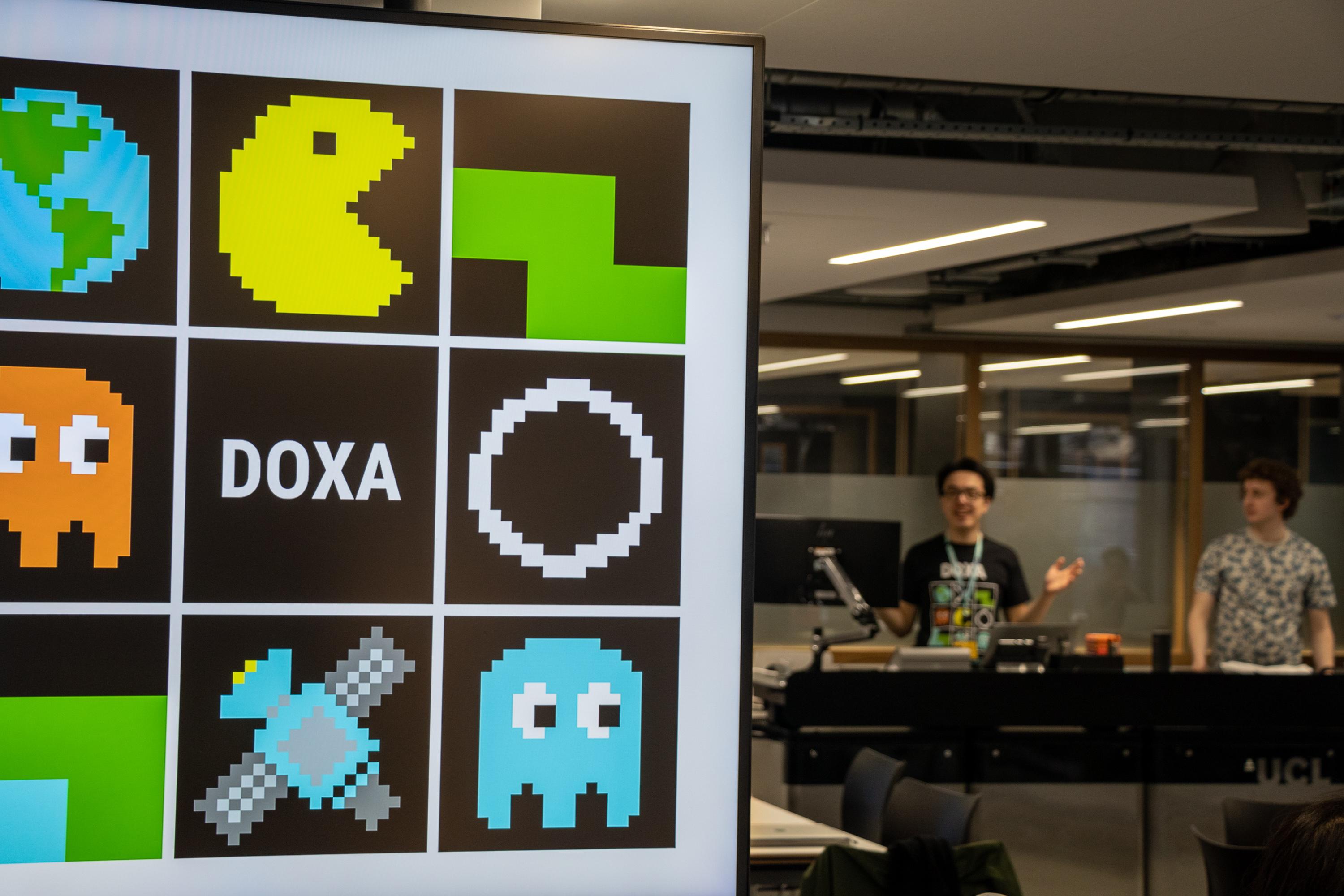We are DOXA AI 😎
Our Team
Our Story

We sought to bring together students to tackle climate change. 🌍
In late 2021, the UCL Artificial Intelligence Society was in the advanced stages of planning ClimateHack.AI 2022: an international datathon that challenged students from 25 world-leading universities across the UK, US and Canada to improve on the state of the art in satellite imagery nowcasting.
But, in the development team, we faced a serious problem: we needed a platform to host the competition launching just one month later.
Lacking affordable alternatives that met our needs as a student initiative looking to do good for the climate, we decided that the best course of action would be to adapt an alpha version of our platform – originally built to run multi-agent tournaments such as in ultimate tic-tac-toe – for ClimateHack.AI.
Following a period of intensive work, the platform and challenge were ready just in time for the start of ClimateHack.AI, which from January to March 2022 saw DOXA AI handle 2,200+ submissions from 300+ registered users internationally.
Development continued over the course of the competition, with the platform gaining custom visualisations of user submissions and being upgraded to support more computationally demanding models via a new GPU execution environment.
AI competitions can crowdsource innovative solutions for humanity's most pressing challenges. 🏆
Our challenge partner for ClimateHack.AI 2022 was Open Climate Fix: a non-profit lab entirely focused on rapidly reducing greenhouse gas emissions.
Purely to account for the variability of solar power generation, electricity system operators worldwide maintain a spinning reserve of fossil fuel power generation, typically based on natural gas. In Great Britain alone, this leads to the equivalent of 100,000 tonnes in additional CO2 emissions annually.
As such, Open Climate Fix have been seeking to develop the best near-term solar photovoltaic power production forecasting system for use by National Grid ESO and other grid operators worldwide, which could go a long way towards supporting the transition to solar and cutting emissions.
The winning team of ClimateHack.AI from the University of Illinois Urbana-Champaign, taking inspiration from image processing techniques, developed a state-of-the-art approach for satellite imagery nowcasting .
This has since gone on to inform Open Climate Fix's solar photovoltaic nowcasting research, and they are now running a live production solar power forecasting service currently being used by National Grid ESO in the UK to help balance the grid, and also by many other PV operators and energy traders.
Our journey is only just beginning. 🚉
DOXA AI has huge potential to create a positive impact in the world.
Following the success of ClimateHack.AI 2022, DOXA AI has gone on to win in Innovative Online Engagement at the UCL Students' Union Societies Awards two years in a row both in 2022 and 2023. In February 2023, we also won a prize at the UCL AI Foundry Demo Day held at Microsoft Reactor in London.
Our platform has been used in education to encourage enthusiastic beginners to delve into machine learning, as well as to power DOXATHON 2023, which was a fun event we held to bring our AI and computer science community at UCL together to compete in single- and multi-agent tournaments on our platform.
Recognising the power of large-scale machine learning competitions, we have therefore decided to launch DOXA AI as a start-up offering engaging automated AI competitions as a scalable service. In addition, we are taking a lead in hosting and organising ClimateHack.AI 2023.
How the DOXA AI platform works
From hosting high-impact grand challenges, such as ClimateHack.AI, to fun multiplayer game tournaments, the DOXA AI platform has been engineered from the ground up to be performant, robust and scalable. 😎
Our platform is a flexible, scalable, event-driven distributed system supporting competitions that run batches of parallelised potentially multi-agent evaluations. It supports custom scoring metrics, execution environments, competition event hooks and significantly more. 👀
Core backend services are written in the much-loved systems language, Rust 🦀, whereas competition services, which implement key competition logic, are implemented in the language of data science, Python 🐍.
Services use gRPC and Apache Pulsar for synchronous and asynchronous inter-service communication, respectively 📧. We use PostgreSQL as our primary relational database, as well as Redis as a performant key–value store.
Our frontend services are largely written in JavaScript ☕. Our website uses the Next.js React framework to embrace that sweet server-side rendering magic, while our API is built atop NestJS.
DOXA AI also has a fledgeling design system used to maintain a degree of consistency across our platform and the other sites that make up our online presence. It consists of reusable React components styled with Sass 🕶.
Finally, our platform serves as an OpenID Connect and OAuth 2 provider to an increasing number of applications that integrate with our platform and consume our APIs 🕵️♂️. This includes the DOXA CLI 💻, external services 🤖 and competition participant portals 🌍.
Get Involved
If you want to find out more about DOXA AI and our ongoing competitions, or if you are interested in hosting a competition on our platform, join the DOXA AI Community Discord server or contact us.
Legal Stuff
DOXA AI Ltd is a private company registered in England and Wales on Tuesday 20th June 2023 with company number 14948864.

